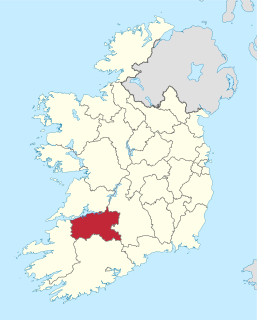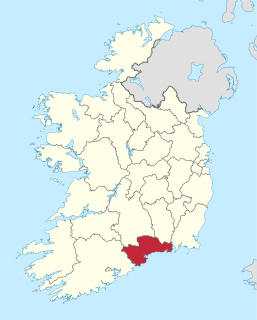
Rail transport in Ireland is provided by Iarnród Éireann in the Republic of Ireland and by Northern Ireland Railways in Northern Ireland.
The Seventh Amendment of the Constitution Act 1979 is an amendment to the Constitution of Ireland that provides that the procedure for the election of six members of the Senate in the university constituencies could be altered by law. It was approved by referendum on 5 July 1979 and signed into law on 3 August of the same year.
In Ireland, direct elections by universal suffrage are used for the President, the ceremonial head of state; for Dáil Éireann, the house of representatives of the Oireachtas or parliament; for the European Parliament; and for local government. All elections use proportional representation by means of the single transferable vote (PR-STV) in constituencies returning three or more members, except that the presidential election and by-elections use the single-winner analogue of STV, elsewhere called instant-runoff voting or the alternative vote. Members of Seanad Éireann, the second house of the Oireachtas, are partly nominated, partly indirectly elected, and partly elected by graduates of particular universities.

A local electoral area is an electoral area for elections to local authorities in Ireland. All elections use the single transferable vote. The Republic of Ireland is divided into 166 LEAs, with an average population of 28,700 and average area of 423.3 square kilometres (163.4 sq mi). The boundaries of LEAs are defined by statutory instrument, usually based lower-level units called electoral divisions (EDs), with a total of 3,440 EDs in the state.

The current Constitution of Ireland came into effect on 29 December 1937, repealing and replacing the Constitution of the Irish Free State, having been approved in a national plebiscite on 1 July 1937 with the support of 56.5% of voters in the then Irish Free State. The Constitution was closely associated with Éamon de Valera, the President of the Executive Council of the Irish Free State at the time of its approval.

The functions of local government in the Republic of Ireland are mostly exercised by thirty-one local authorities, termed County, City, or City and County Councils. The principal decision-making body in each of the thirty-one local authorities is composed of the members of the council, elected by universal franchise in local elections every five years from multi-seat local electoral areas using the single transferable vote. Many of the authorities' statutory functions are, however, the responsibility of ministerially appointed career officials termed Chief executives. The competencies of the city and county councils include planning, transport infrastructure, sanitary services, public safety and the provision of public libraries. Each local authority sends representatives to one of three Regional Assemblies.

The Local Government Act 2001 was enacted by the Oireachtas on 21 July 2001 to reform local government in the Republic of Ireland. Most of the provisions of the Act came into operation on 1 January 2002. The act was a restatement and amendment of previous legislation, which was centred on the Local Government (Ireland) Act 1898. The 2001 act remains in force, although significantly amended by the Local Government Reform Act 2014.
This page lists Dáil constituencies that have been used for elections to Dáil Éireann from the 1918 election to the next general election.
The Chief Executive of a city or county is the senior permanent official in local government in the Republic of Ireland. Whereas the county council and city council are elected officials who formulate policy, the chief executive is an appointed official who manages the implementation of policy. The position was introduced in 1929–42 based on the American council–manager government model, and until 2014 the chief executive was styled the county manager or city manager. Their salaries range from €132,511 to €189,301 per annum. The County and City Management Association is the professional association for chief executives, and it is affiliated to the International City/County Management Association (ICMA).
In Ireland, the term city has somewhat differing meanings in Northern Ireland and the Republic of Ireland.

The Local Government Reform Act 2014 is an act of the Oireachtas which provided for a major restructuring of local government in the Republic of Ireland with effect from the 2014 local elections. It merged some first-tier county and city councils, abolished all second-tier town and borough councils, and created a new second tier of municipal districts covering rural as well as urban areas. It also provided for a plebiscite on whether to create a directly elected executive Mayor of the Dublin Metropolitan Area although this provision was not activated. The act was introduced as a bill on 15 October 2013 by Phil Hogan, the Minister for the Environment, Community and Local Government, and signed into law on 27 January 2014 by President Michael D. Higgins. Most of its provisions came into force on 1 June 2014.

Limerick City and County Council is the authority responsible for local government in the City of Limerick and County Limerick in Ireland. It came into operation on 1 June 2014 after the 2014 local elections. It was formed by the merger of Limerick City Council and Limerick County Council under the provisions of the Local Government Reform Act 2014. As a city and county council, it is governed by the Local Government Act 2001. The council is responsible for housing and community, roads and transportation, urban planning and development, amenity and culture, and environment. The council has 40 elected members. Elections are held every five years and are by single transferable vote. The head of the council has the title of Mayor. The city and county administration is headed by a Chief Executive, Pat Daly. The administrative centre is Limerick. Following a plebiscite in 2019, Limerick will become the first local authority in Ireland with a directly elected mayor.
The Republic of Ireland has limited use of order of precedence.
The 1945 local elections in Ireland were held on 14 June 1945 to fill all council seats for most counties and county boroughs and municipal towns. The state was still under the Emergency of the Second World War. As a cost-saving measure, electoral law was amended to bring forward the date of the local elections a few weeks to coincide with the 1945 presidential election.
The 1960 local elections were held from 23 to 30 June 1960 for the council seats in all counties, cities and towns of the Republic of Ireland. A total of 2,745 candidates stood for 1,454 seats.
There have been several proposals for a directly elected mayor of the Dublin metropolitan area in Ireland. The area corresponds to the former Dublin County, and comprises four local authority areas, namely the city of Dublin and the counties of South Dublin, Fingal, and Dún Laoghaire–Rathdown. Currently, the elected councillors of each local authority area choose a chairperson or mayor annually from among their number as a ceremonial head with no extra powers. The chairperson of Dublin City Council is the Lord Mayor of Dublin, a ceremonial position separate from the proposed executive mayor. This is similar to the distinction between the ancient office of Lord Mayor of London and the office of Mayor of London established in 2000.

The 2019 Irish local elections were held in all local authorities in Ireland on Friday, 24 May 2019, on the same day as the 2019 European Parliament election and a referendum easing restrictions on divorce. Each local government area is divided into local electoral areas (LEAs) where three to seven councillors are elected on the system of proportional representation by means of the single transferable vote.

A Cork City Council election was held in Cork city in Ireland on 24 May 2019 as part of that year's local elections. Thirty-one councillors were elected from five local electoral areas (LEAs) by single transferable vote. This election broadly coincided with an increase in the city council area, and several outgoing members of Cork County Council, based in areas transferred to the city, stood for election to the city council. Besides extending all LEAs into the former county area, the former LEA of North Central was abolished and its area divided between North West and North East.

A Limerick City and County Council election was held in County Limerick and Limerick City in Ireland on 24 May 2019 as part of that year's local elections. All 40 councillors were elected for a five-year term of office from 6 local electoral areas (LEAs) by single transferable vote.

A Waterford City and County Council election was held in County Waterford and Waterford City in Ireland on 24 May 2019 as part of that year's local elections. All 32 councillors were elected for a five-year term of office from 6 local electoral areas (LEAs) by single transferable vote.










